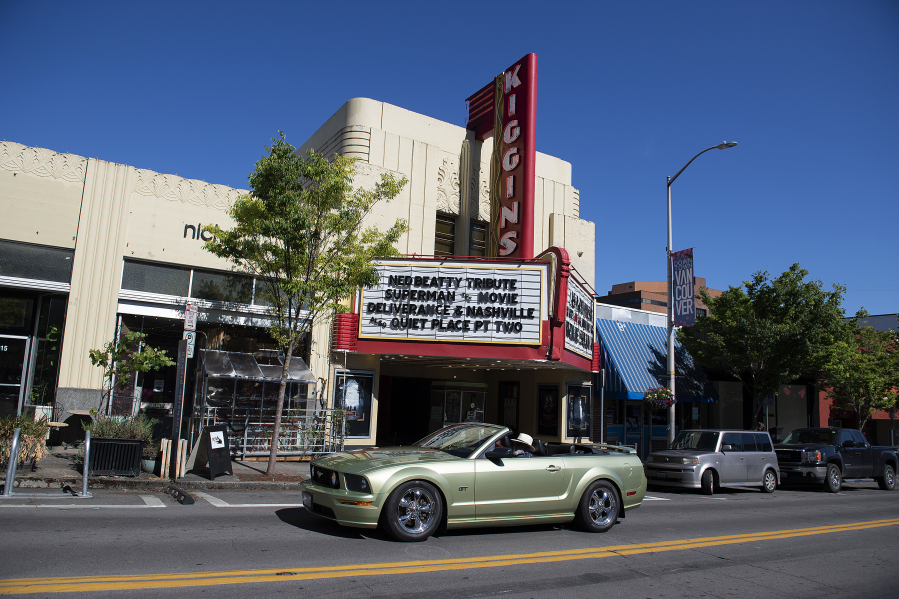Two months after they applied, about three months after they thought the process would be over and more than six months after Congress set aside $16 billion to create the Shuttered Venue Operators Grant program, Clark County’s theater and venue owners are starting to receive the long-promised financial support.
Some local owners are still waiting, however. The U.S. Small Business Administration began rolling out grants in late May, but as of June 1, it had awarded only 31 grants out of 13,619 submitted applications. As of Monday, the total stood at 2,390 grants awarded out of 14,638 submitted applications.
The Kiggins Theatre in downtown Vancouver finally received its approval letter on Tuesday, according to owner Dan Wyatt. The Battle Ground Cinema multiplex is still waiting for the verdict on its own application. The slow approval pace has become the latest in a series of problems for venue owners over the past six months.
“This program passed in December,” said Marina Gephart, director of communications and media for Prestige Theatres, which owns Battle Ground Cinema. “We never in our wildest dreams thought we’d be waiting this long.”
A group of 55 U.S. senators, including Washington Democrats Maria Cantwell and Patty Murray, signed a June 15 letter to SBA Administrator Isabella Casillas Guzman urging her to speed up the grant-approval process. More than 200 House members — including Rep. Jaime Herrera Beutler, R-Battle Ground — sent a similar letter the following day.
Slow rollout
The Shuttered Venue Operators Grant program presented an attractive option for venue owners, many of whom had been partially or completely shuttered since the COVID-19 pandemic began. Entertainment venues are among the hardest-hit businesses in the country.
Instead of applying for a second loan through the Paycheck Protection Program, operators could choose to apply for a Shuttered Venue Operators Grant to make up for their lost revenue, with a wider range of allowable uses and an individual cap of $10 million instead of the second-round Paycheck Protection Program cap of $2 million.
Unlike the Paycheck Protection Program, the Shuttered Venue Operators Grant program was new and required the creation of a set of rules and application system. By February, venue owners in Clark County and nationwide began to express frustration with the lack of a clear timeline for the program’s rollout.
The Shuttered Venue Operators Grant application portal on the Small Business Administration’s website was initially scheduled to go live April 8, but venue owners who attempted to sign in that day found they were unable to complete the process. The Small Business Administration later announced that the portal launch would be delayed due to technical problems.
The portal relaunched April 26, and Gephart said Prestige submitted its grant applications that same day for Battle Ground Cinema and the company’s other multiplexes in Sandy, Ore., and Independence, Ore.
All three applications received first-priority status, she said — meaning that the businesses had suffered a revenue loss of at least 90 percent — which according to the program rules meant they would receive funds in the first two weeks.
“We assumed that meant within two weeks of applying,” she said, but they later received clarification that it would be within the first two weeks once the first grants began receiving approval — and for several weeks after Prestige submitted its application, there was no word on when distribution would begin.
Wyatt said the Kiggins fell just short of the cutoff to be a first-priority grant recipient. Even with second-tier status, he had expected a clearer picture about the funding by June, he said, but was still in the dark as recently as last week.
Despite the low approval total so far, Gephart expressed optimism that at this point the funding truly is only a couple more weeks away. The pace of approvals has increased in the past two weeks, and she said the National Association of Theater Owners told its members that the Small Business Administration had pledged to bring on more staff to speed up the process.
“There are some promising things happening,” Gephart said. “We’re finally seeing some action.”
Capacity limits easing
The Shuttered Venue Operators Grant money isn’t the only breakthrough that theater owners have been waiting for. Following a timetable that Gov. Jay Inslee laid out in mid-May, Washington officially ended all of its statewide social distancing requirements on Wednesday, allowing theaters to reopen their auditoriums at full capacity. Local theaters have done their best to operate at half capacity, but the full-house milestone is a prerequisite for theaters to return to true profitability, according to Gephart and Wyatt.
Clark County entered Phase 2 of the state’s reopening plan in February, allowing entertainment venues to reopen at 25 percent capacity. Some theaters, including the two local AMC multiplexes, dipped their toes back into the water almost immediately, but Prestige chose to wait until more blockbuster releases were available.
The capacity limit rose to 50 percent in March when the county moved to Phase 3. Battle Ground Cinema reopened in April, which Gep-hart said was partially due to the timing of major films’ releases, but also because staff had assumed that the Shuttered Venue Operators funding would be available during that month.
The theater has had some success since then, she said, thanks to big releases, such as “A Quiet Place Part II” and “Cruella.” In fact, “A Quiet Place Part II” was able to beat the first movie’s opening weekend sales performance from 2019. But not every night has been so successful, Gephart said, and the theater is still operating at a near-daily loss.
“It’s going to be a really long runway to compensate for our losses, and we were counting on this (grant) money,” she said.
When the Shuttered Venue Operators money does come through, Prestige Theatres owner Elie Kassab said, the highest priority will be to pay deferred rent, which will reach approximately $500,000 in July.
At the Kiggins Theatre, Wyatt said there have been some successful days, such as the relaunch of the theater’s “Noir Nights” shows and a screening of “The Rocky Horror Picture Show,” which sold out under the 50 percent occupancy restrictions.
Even with the state reopening, it may take more time for the pipeline of new movies to ramp back up to the point where theater auditoriums sell out, Wyatt said, making the Shuttered Venue Operators funds an essential lifeline in the meantime.
“We’re back open, and we’re cruising along,” he said. “We had a couple really good weekends with ‘A Quiet Place Part II,’ but I am still in a little bit of a holding pattern until this funding comes through.”




